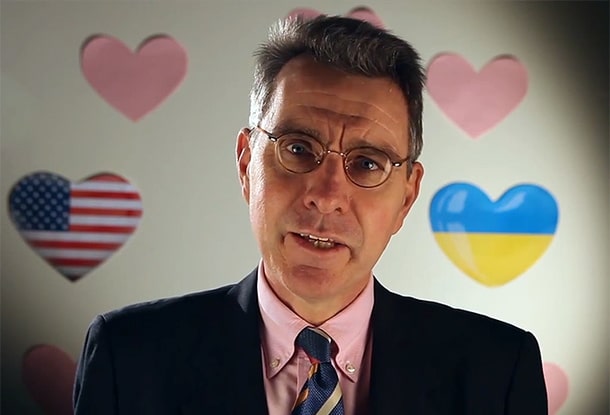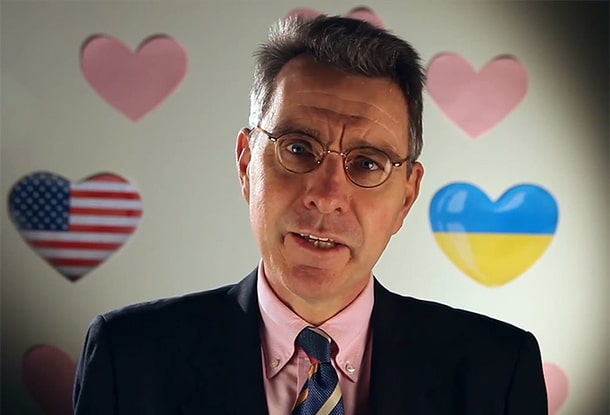We noted in a previous post how important Ukraine was to George Soros, with documents from DC Leaks that show Soros, and his Open Society NGO, scouring the Greek media and political landscape to push the benefits of his Ukraine coup upon a Russian leaning Greek society.
Now more documents, in the massive 2,500 leaked tranche, show the immense power and control Soros had over Ukraine immediately following the illegal Maidan government overthrow.
Soros and his NGO executives held detailed and extensive meetings with just about every actor involved in the Maidan coup: from US Ambassador Geoffrey Pyatt, to Ukraine’s Ministers of Foreign Affairs, Justice, Health, and Education.
The only person missing was Victoria Nuland, though we are sure those meeting minutes are waiting to see the light of day.
Plans to subvert and undermine Russian influence and cultural ties to Ukraine are a central focus of every conversation. US hard power, and EU soft power, is central towards bringing Ukraine into the neo-liberal model that Soros champions, while bringing Russia to its economic knees.
Soros’ NGO, International Renaissance Foundation (IRF) plays a key role in the formation of the “New Ukraine”…the term Soros frequently uses when referring to his Ukraine project.
In a document titled, “Breakfast with US Ambassador Geoffrey Pyatt”, George Soros, (aka GS), discusses Ukraine’s future with:
Geoffrey Pyatt (US Ambassador to Ukraine); David Meale (Economic Counsellor to the Ambassador); Lenny Benardo (OSF); Yevhen Bystrytsky (Executive Director, IRF); Oleksandr Sushko (Board Chair, IRF); Ivan Krastev (Chariman, Centre for Liberal Studies); Sabine Freizer (OSF); Deff Barton (Director, USAID, Ukraine)
The meeting took place on March 31, 2014, just a few months after the Maidan coup, and weeks before a full out civil war erupted, after Ukraine forces attacked the Donbass.
In the meeting, US Ambassador Pyatt outlines the general goal for fighting a PR war against Putin, for which GS is more than happy to assist.
Ambassador: The short term issue that needs to be addressed will be the problem in getting the message out from the government through professional PR tools, especially given Putin’s own professional smear campaigns.
GS: Agreement on the strategic communications issue—providing professional PR assistance to Ukrainian government would be very useful. Gave an overview of the Crisis Media Center set up by IRF and the need for Yatseniuk to do more interviews with them that address directly with journalists and the public the current criticisms of his decision making.
Pyatt pushes the idea of decentralization of power for the New Ukraine, without moving towards Lavrov’s recommendation for a federalized Ukraine.
GS notes that a federalization model would result in Russia gaining influence over eastern regions in Ukraine, something that GS strictly opposes.
Ambassador: Lavrov has been pushing the line about constitutional reform and the concept of federalization in Russia.The USG reaffirmed it will not negotiate over the heads of the Ukrainians on the constitutional reform issue and that Ukraine needs to decide on this issue for itself. He noted that there are templates for devolution that can be used in this context but that the struggle will be to figure out how to move forward with decentralization without feeding into Russian agenda.
GS: Federalization plan being marketed by Putin to Merkel and Obama would result in Russia gaining influence and de facto control over eastern regions in Ukraine. He noted Lavrov has clear instructions from Putin to push the line on federalization.
Ambassador: Secretary Kerry would be interested to hear GS’s views on the situation directly, upon return from his trip.
SF: There is no good positive model for federalization in region, even models of decentralization are very poor because the concept is not very common. The institutions need for decentralization do not yet exist and need to be built.
YB: Ukraine should pursue a decentralization policy based on the Polish decentralization model. IRF funded the development of a plan based on this model previously and those involved are now advisers to government on this issue. Noted it is also important to encourage the constitution council created y government to be more open and involve independent experts.
Ambassador: Constitutional reform issue as the most urgent issue facing Ukraine—there is a need to decentralize in order to push democracy down to the local level and break the systemic corruption that results from Kiev’s authority over the local governments.
Ambassador: Russian propaganda machine telling Kharkhiv and Donbass residents that the government in Western Ukraine is looking to take away their resources and rights through decentralization process, feeding into Lavrov’s line that the Ukrainian government is dysfunctional and not successful as a unitary state, making it a necessity to have federalization.
The participants cannot stop fixating on Russia and Putin throughout the meeting. The Ukraine project seems to be more about sticking it to Russia, then about saving a country about to fall into the abyss.
US Ambassador Pyatt hands over full control to George Soros, and point blank asks him, “what USG should be doing and what the USG is currently doing.”
Soros’ response is stunning, “Obama has been too soft on Putin.”
Ambassador: Asked GS for a critique of US policy and his thoughts on what USG should be doing.
GS: Will send Ambassador Pyatt copies of correspondences he previously sent to others and his article in NY Review of Books.Obama has been too soft on Putin, and there is a need to impost potent smart sanctions. He noted the need for a division of labor between the US and the EU with the US playing the bad cop role. The USG should impose sanctions on Russia for 90 days or until the Russian government recognizes the results of the presidential elections. He noted that he is most concerned about transitional justice and lustration.
Ambassador: USG will organize conference with the British at the end of April on financial crimes that will bring together senior level government officials and representatives of the international community to discuss where money went. He noted his worries about the complete implosion of the Party of Regions and will be speaking to IRI and NDI about offering assistance to reconstruct the party for the post-Yanukovych era.
US Ambassador Pyatt decides to take out Tymoshenko from the New Ukraine equation.
She served her purpose as a poor and sick political prisoner while Yanukovich was in power, saying that “Tymoshenko is associated with everything undignified”…
Ambassador: Personal philosophy on the greatest need for Ukraine right now is the need for national unification. This will not happen under Tymoshenko because she is perceived as a hold over of the old regime and a very divisive personality.He calls the revolution a “revolution of dignity” and Tymoshenko is associated with everything undignified.
GS: Need to cleanse the “original sin” that all of the current presidential candidates are marked with in order for Ukraine to move forward.
Concern over the Pravy Sector, and how to disarm, or integrate, the muscle that was used to instigate much of the violence during the Maidan is debated.
Soros even throws out his suspicion that the Privy Sector has been infiltrated, and now is working under Russia’s FSB.
GS: Belief that the Pravy Sector is an FSB plot and has been funded to destabilize Ukraine
Ambassador: Agreed that this was at least partly true, but the problem now is that Pravy Sector has become organic and is still armed. There is a need for the government to figure out how to demobilize and disarm the Pravy Sector.
GS: How can we defend against Putin’s attempts to destabilize the May elections?
Ambassador: The international community should send in a flood of observers from the OSCE and other institutions. The US Embassy is also currently working with the local intelligence agencies to monitor the situation and they have already found Russian agents. He noted that a second ambassador, Cliff Bond, will be brought into the embassy to focus on the longer term questions such as decentralization, lustration, e-governance, and anti-corruption and will be coordinating with the donor community on these issues. Obama has instructed the embassy to focus primarily on economic support and assistance for Ukraine, avoiding military support or assistance.
GS: Hopes that going forward there will be close contact and cooperation between the US Embassy and the IRF.
The Full PDF of the 2014 George Soros minutes can be downloaded here: – Ukraine Working Group 2014-gs ukraine visitmarch 2014note.
The meeting minutes documented present a clear and conclusive case that George Soros and his International Renaissance Foundation (IRF) manipulated Ukraine into moving towards an untenable and self destructive direction.
In one meeting under the title, “Civil Society Roundtable Meeting”, Crimea fifth column schemes are advanced as viable solutions to those participating in the discussion.
Likewise we see how involved Soros was in making sure a Ukraine under federalisation is completely undermined at the highest levels, influencing Merkel and Obama to reject such initiatives.
In hindsight it has now become clear that the only way Ukraine was going to survive the coup in one piece was to move towards a federalised model of governance.
He [George Soros] noted that Ukraine is in grave danger because Putin knows he cannot allow the new Ukraine to succeed. He reiterated his points about the conversations Putin has had with Merkel and Obama about federalism and his concerns surrounding that development. He noted that he hasn’t had direct feedback yet regarding this issue and is basing his worries on second hand information about the reactions of Merkel and Obama. But he reiterated the need for the Ukrainian government to respond loudly and immediately.
Reprinted with permission from The Duran.



